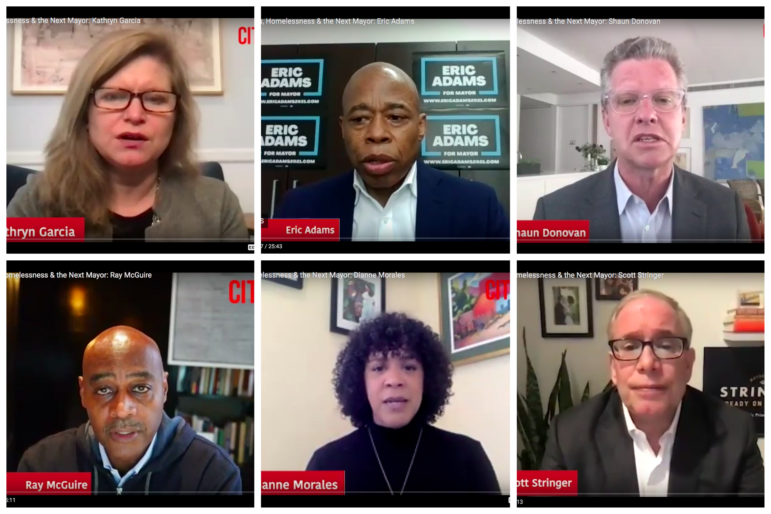Homelessness survivors played a lead role in creating a video voters’ guide on family homelessness starring Eric Adams, Shaun Donovan, Kathryn Garcia, Ray McGuire, Dianne Morales and Scott Stringer.

WATCH:
A Video Voters’ Guide to Family Homelessness in the Mayoral Race
It does not take a rocket scientist, or even a mayoral candidate, to figure out that having 16,000 children in the city’s homeless shelter system is a problem. But what do they want to do about it?
Eric Adams wants to create more housing—by repurposing hotels and incentivizing small landlords to keep their rentals cheap—and align the city’s stock of affordable housing to better serve needs.
Shaun Donovan offers more flexible spending, especially in response to domestic abuse that drives so many families to shelter, and an effort to get more aid from Washington.
Kathryn Garcia advocates moving people to permanent housing fast by increasing the value of rental vouchers, quickening the turnaround of vacated NYCHA units and making it easier to build new units.
Dianne Morales would guarantee housing for all and gather the entire housing portfolio under a single deputy mayor.
Ray McGuire says he’d build “truly, deeply affordable homes” and put in place a web of services “to hep those who are the formerly incarcerated, to help those who suffer from domestic abuse, to help those who are suffering from some kind of serial drug abuse and help those—which is an increasing number—who have and are suffering from emotional and mental stress.”
And along with safe-haven beds and drop-in centers for the street homeless, Scott Stringer promises 40,000 units of housing for the lowest-incomes. The problem with the city’s approach to homelessness over the past 40 years, he says, “is we keep trying to fix it without homes.”
Such were the answers given when City Limits, as part of a partnership with the Family Homeless Coalition, invited the eight major Democratic candidates for mayor to sit for interviews about their plans for dealing with family homelessness, which have been gathered into a video voters’ guide on that important topic.
With former City Limits reporter Abigail Savitch-Lew serving as moderator, three women who have survived homelessness crafted and asked the questions—posing a similar set to each candidate. The videos, edited by Megan Fu, allow voters to see the entirety of a candidates’ response as well as compare all six candidates’ responses to each question.
The number of homeless families with children has receded substantially over the past four years: The 9,459 families in the system in March was 26 percent less than in March 2017. However, the count remains well above what it was when Bill de Blasio became mayor.
The decrease in the number of homeless families with kids appears to indicate that policy action can reduce the problem. Broader availability of rental vouchers and city-subsidized apartments at affordable rents, as well as the pandemic eviction ban, get credit for the reductions so far.
Families with children are just one facet of the city’s homelessness problem, though they represent about 56 percent of all the people in the shelter system—which, it is worth noting, does not encompass all homeless people.
Adult families (including couples, parents with adult children and other arrangements) have also seen their numbers rise, and then fall, during the de Blasio era. And the number of single adults remains near an all-time high with 18,433 in the system in March, some 8,000 more than at the same point during de Blasio’s first year in office. Their rising numbers are part of why the administration’s handling of the single-adult population—and the reaction of some residents to their presence on the Upper West Side—generated so many headlines last year.
Family homelessness is in many ways a different problem with different impacts, like the challenges homeless students have performing in school. But the candidates’ critiques of the way the city has handled homelessness to date seemed to apply to the broader problem.
“Ronald Reagan was infamous for having said homelessness is a choice. And I think he was right about it being a choice, but he was wrong about whose choice it was,” Morales said. It’s not that families decide to be homeless, she added. “I think it’s the choice of our leadership” in how to deal with it that matters.
City Limits extended invitations to the eight mayoral candidates who’d raised $100,000 by the January finance reporting deadline or polled above 1 percent by the end of February. Adams, Donovan, Garcia, McGuire, Morales and Stringer agreed to the interviews. Maya Wiley and Andrew Yang did not. The two Republican primary candidates, Fernando Mateo and Curtis Sliwa, had not satisfied the criteria in time, but City Limits will extend to the Republican nominee an opportunity to discuss his views on the subject after the primary.










3 thoughts on “What Would NYC’s Mayoral Candidates Do About Homelessness? Let’s Go to the Video”
The only sensible and practical candidate that can seriously talk about housing is Shaun Donovan.
You do not give Maya the opportunity to be covered. Why is that?
Hi Roberta, as the story above notes, all eight of the leading Democratic mayoral candidates were invited to participate in this project. Wiley did not accept.